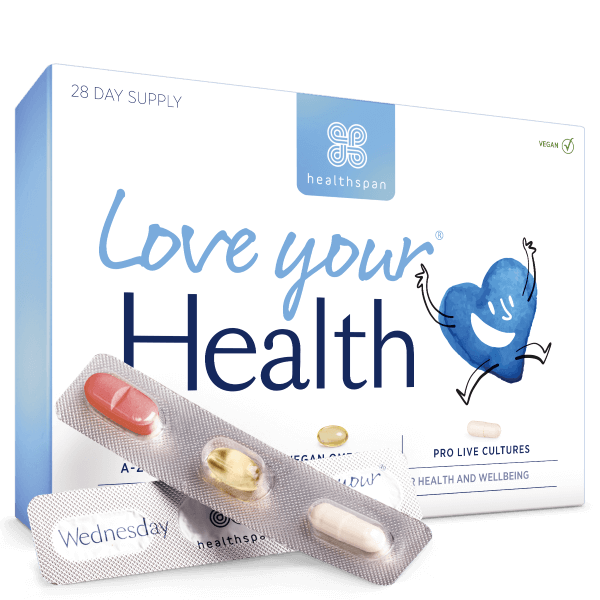It's generally only when we're laid low with an illness that we give our immune system a passing thought. There are a number of steps we can take to make our immune system more effective - starting with a range of essential vitamins and nutrients.
What is the immune system?
We still don't know exactly how the immune system works, but we do know that it's composed of an intricate system of specialised and protective cells, tissues and organs that work together to fight off viruses, bacteria and parasites. It might be complicated, but it's absolutely essential to our survival and health.
We're all born with some level of immunity - an innate immunity - which kicks in from birth to help defend us from potential pathogens like a virus or bacteria. This level of protection develops throughout our lives as we become exposed to diseases, viruses and vaccines, and we gradually build up an arsenal of more specific antibodies to furnish us with more specialised protection - known as adaptive immunity.1
Taking control
Although we can take steps to improve our immune responses, no-one can control theirs entirely. Genetics and age also make us more, or less, susceptible to infection and illness, and it's worth remembering that our immune response capability can become less robust with age. Micronutrient malnutrition (being deficient in essential vitamins and/or minerals) is more common among the elderly.
This is because some nutrients aren't absorbed as readily when we get older, levels of vitamin D produced naturally in the body diminish with age, and we tend to eat less, so we don't get enough of a range of nourishing food to give us the recommended daily intakes of some vitamins and minerals.2 This is where nutritional supplements can make a big difference as even small deficiencies can have potentially harmful consequences that leave the immune system out of sorts.
Ultimately, for this complex and intricate immune system to identify and protect you from potentially harmful invaders, it needs to be carefully balanced and nurtured. Sadly, there is no one 'super' food, vitamin, herb, tonic or lifestyle trend that will do this on its own. General healthy living should, however, help to keep it running smoothly. This includes eating a balanced diet with plenty of nutrient-rich fruit and vegetables, sleeping enough, not smoking, limiting how much you drink, avoiding too much or recurrent stress, taking moderate exercise and some nutritional supplements.3
The vitamins
To ensure your immune system is in its best health, it's important to obtain the following vitamins from your diet:
Vitamin C
This antioxidant vitamin is known to increase the production of white blood cells (leukocytes) which are key to fighting infections. These circulate in the body looking for potential pathogens like bacteria or viruses. The antioxidant properties of vitamin C are thought to limit the effects of free radical damage (rogue molecules that cause oxidative stress) which is implicated in the role of many diseases including heart disease and degenerative conditions.4
As your body doesn't produce this vitamin naturally, or store it, you need regular amounts to contribute to normal immune functioning. Most of us get enough vitamin C from our diet in the form of citrus fruits, strawberries, peppers, fruit juices, leafy green vegetables like spinach and kale. If you don't eat the recommended 5-a-day servings, aim to increase your intake of fruit and vegetables. Vitamin C supplements are also available.
Vitamin D
Vitamin D plays a big role in immunity. When vitamin D levels are low, T cells (protective cells) remain dormant and are unable to fight off serious infections.5 There is also evidence to show those given regular vitamin D supplements suffer fewer respiratory tract infections like colds and 'flu. It's estimated that more than three million people in the UK could avoid infections like colds and 'flu if they had optimal vitamin D levels, yet figures show that more than one in 10 Brits over 40 are deficient.
We are particularly at risk of deficiency between October and March when there isn't much sun in the UK to trigger its synthesis in our skin, and because it is difficult to obtain through diet alone. In fact, the National Institute for Health and Care Excellence (NICE) recommends that all adults in the UK take a daily supplement containing 400IU (10mcg) of vitamin D throughout the year.6
Vitamin B6
This is another essential vitamin for supporting the immune system. Good food sources of vitamin B6 include oily fish (e.g. salmon and mackerel), chicken, offal, wholegrains and green leafy vegetables. Vitamin B6 is needed to manufacture antibodies that combat harmful bacteria and viruses to help improve immune responses.7
Vitamin E
This is a potent antioxidant that is found in a range of foods, including nuts and seeds, nut butters, plant oils, avocado, mango, kiwi fruits and wheatgerm. Most of us get enough vitamin E from our food, but if you're on a low-fat diet you may not obtain enough of this fat-soluble micronutrient. Like vitamin C, vitamin E helps to protect the body from oxidative stress caused by free radical damage. It also helps stimulate the body's immune responses: in trials, for example, elderly people given vitamin E supplementation were shown to have an enhanced immune response.8
The minerals
Aside from vitamins, there are also some key minerals that can help to keep the immune system healthy. These include:
Zinc
Found in foods like oysters, crab, oats, sesame seeds, poultry, chickpeas and baked beans, zinc can help to balance the immune response and reduce inflammation in the body that can lead to infection and disease.9 Taking zinc supplements at the first sign of a cold also appears to reduce the effects of the illness.10
Selenium
Selenium is an antioxidant mineral found in foods like Brazil nuts, seafood, poultry, eggs, seeds and soy products. It has long been associated with lower resistance to infection and there is increasing evidence to suggest it can strengthen the immune response in a number of ways.11 The antioxidant properties of selenium also help reduce oxidative stress (cell damage caused by free radicals) which has been linked to chronic diseases like heart disease and Alzheimer's. It is thought selenium helps neutralise excess free radicals and has a protective effect on cells. It also has an antiviral action; needed to make antibodies.
Magnesium
This mineral, found in nuts, seeds, wholegrains, green vegetables and pulses, plays a key role in the immune system helping to support vital protective cell functions and reduce inflammation in the body. Research involving the elderly and athletes has shown those deficient in magnesium experienced compromised immunity, putting them at greater risk of illness.12
The bottom line
If you want your immune system to flourish, you should aim to consume a balanced, varied diet, with at least five, but ideally seven or more, fruit and vegetables daily. On top of this, taking daily vitamin supplements can help, but bear in mind that you also need to pay attention to various lifestyle factors. Sleep, for example, is crucial: those of us who sleep around six hours or less nightly are four times more likely to come down with a virus compared to those who get a good seven hours or more.13
Exercise will also help - but don't push yourself too hard. Moderate and regular exercise can partially stimulate the immune response, whereas overexerting yourself can actually lead to immunosuppression.14 Exercise is also an effective way to combat stress: this is difficult to avoid entirely, and in short bursts can actually enhance immunity, but persistent stress reduces the immune system's ability to fight off infection and disease.15
If you'd like to learn a bit more about how to keep your immune system healthy, select Immunity from the Your Health menu above.

Love Your Health
Three daily supplements essential for health and wellbeing
- Full-spectrum multivitamin to support your immune health and energy
- 500mg algal omega 3 capsule to support brain, heart and vision
- Pro cultures capsule with 5 billion live friendly bacteria







